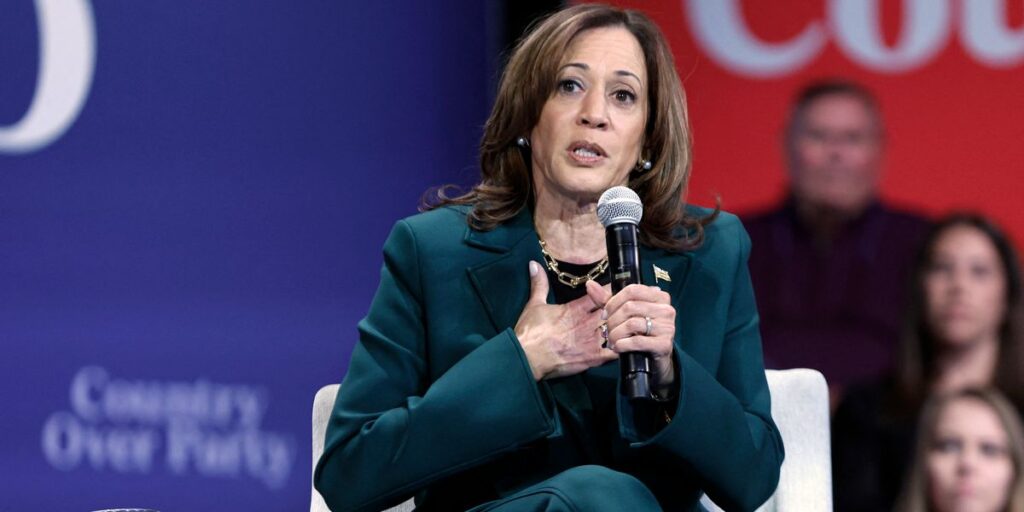Vice President Kamala Harris hosted a culmination event of her swing-state tour in Brookfield, Wisconsin, alongside former Republican Representative Liz Cheney and conservative radio host Charlie Sykes. This marked the third conversational engagement on the tour designed to reach moderate Republicans and independents. The setting in Waukesha County, a historically conservative area that leaned slightly Democratic in the past electoral cycle, underscored the strategic aim of fostering broader bipartisan support against former President Donald Trump, who remains a polarizing figure within American politics. The event’s focus was on uniting conservative and liberal constituents around shared concerns regarding the democratic process, the rule of law, and the overall moral fabric of the nation in light of Trump’s presidency.
Harris, Cheney, and Sykes strategically emphasized their mutual concerns over Trump’s behavior, particularly his perceived undermining of American democracy and institutions. Sykes introduced the conversation with a lighthearted reference to the importance of Waukesha County in the electoral landscape before directing a pointed question to Harris about why she expected Republicans to abandon their party values for her campaign. Harris responded by underscoring the necessity for all Americans to prioritize democratic principles over partisan politics. Cheney echoed this sentiment, recounting her personal sacrifices for standing against Trump, particularly after her impeachment vote and efforts in the Capitol riot investigation, illustrating the weight of principled political sacrifice.
During the event, Cheney sought to bolster her argument for cross-party voting by referencing Al Gore’s respectable concession to George W. Bush post-election in 2000, contrasting it with Trump’s refusal to accept the 2020 election results. Cheney warned her audience against the existential threat posed by Trump’s departure from established norms, urging citizens to prioritize constitutional fidelity above partisan loyalty. She expressed her concern regarding the excessive measures taken by certain states against abortion rights while emphasizing a more protective role for the federal government. Notably, Cheney’s critique did resonate with some voters who have been distressed over the direction the GOP has taken on social issues under Trump’s influence.
Adding levity to the evening, Cheney delivered a memorable quip about Trump, stating that if one wouldn’t trust him to babysit their children, they certainly shouldn’t support his presidential candidacy. This remark elicited laughter and applause, illustrating her adeptness at connecting with an audience that spans different political affiliations. However, the presence of Cheney, a figure often linked with the more hawkish elements of the Republican Party, sparked mixed reactions, particularly among progressive attendees who harbor deep-seated grievances toward the Cheneys’ historical hawkish foreign policies, particularly Dick Cheney’s role in the Iraq War.
The dialogue also pivoted toward criticisms of the Biden administration’s foreign policy in the context of the ongoing Israel-Hamas conflict, with an audience member challenging Harris directly. Although the concerns encompassed a myriad of domestic and international issues, Harris sidestepped this critique by reaffirming her commitment to U.S. interests and countering Russia’s aggression in Ukraine. It was indicative of the balancing act Harris is attempting as she seeks to cultivate support from both moderate conservatives and progressives who may have reservations about aspects of her and the Biden administration’s policy decisions.
While many audience members were Democrats, a significant contingent of attendees included former Republicans who distanced themselves from their party during or after Trump’s 2016 presidency. Feedback from this demographic highlighted various reasons for their political shift, including disillusionment with Trump’s divisive rhetoric and actions, particularly on immigration policy. An attendee identified as Cathy Waller, formerly associated with the Republican Party in Waukesha County, articulated her dissatisfaction with Trump, reinforcing how the party’s current trajectory had alienated long-standing Republican ideals. Others like Penny Miller shared a more complex transition from initial Trump support based on economic expectations to frustration over his demeanor and governance style.
Despite the event’s invigorating exchanges, some attendees voiced the need for more direct conversation from Harris regarding pressing issues like the economy and immigration. As electoral polls indicate a tightening contest for Wisconsin, Harris faces an uphill battle to maintain or improve upon President Biden’s performance among educated suburban voters. The discourse at this event was a microcosm of the broader political landscape, comprising a spectrum of opinions from both sides of the aisle, further emphasizing the intricate dynamics of the upcoming election and the evolving nature of party allegiances in contemporary American society.

